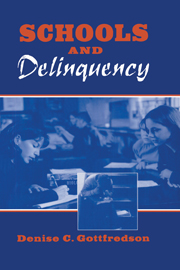Book contents
- Frontmatter
- Contents
- List of Tables and Figure
- Acknowledgments
- 1 School's Potential as a Location for Delinquency Prevention
- 2 School-Related Individual Characteristics, Attitudes, and Experiences
- 3 School Effects
- 4 Field Studies of School-Based Prevention: An Overview
- 5 Changing School and Classroom Environments: The Field Studies
- 6 Changing Student Personality, Attitudes, and Beliefs: The Field Studies
- 7 Lost in Translation: Why Doesn't School-Based Prevention Work as Well as It Should?
- 8 Where Do We Go from Here?
- References
- Author Index
- Subject Index
8 - Where Do We Go from Here?
Published online by Cambridge University Press: 05 August 2011
- Frontmatter
- Contents
- List of Tables and Figure
- Acknowledgments
- 1 School's Potential as a Location for Delinquency Prevention
- 2 School-Related Individual Characteristics, Attitudes, and Experiences
- 3 School Effects
- 4 Field Studies of School-Based Prevention: An Overview
- 5 Changing School and Classroom Environments: The Field Studies
- 6 Changing Student Personality, Attitudes, and Beliefs: The Field Studies
- 7 Lost in Translation: Why Doesn't School-Based Prevention Work as Well as It Should?
- 8 Where Do We Go from Here?
- References
- Author Index
- Subject Index
Summary
twenty years ago, an extensive review of delinquency prevention and treatment programs (Wright and Dixon, 1977) concluded that little evidence of positive effects for prevention programs could be found in the available research, but that implementation quality and quantity helped to explain the success of the relatively few programs that produced positive results. Today we can conclude that considerable evidence of positive effects for prevention programs can be found in the available research, but that implementation quality and quantity qualify the positive findings. Schools can be a site for effective intervention, or a site for nonintervention or ineffective intervention. Schools have the potential to contribute to the positive socialization of youth. But the range of conditions under which they have been demonstrated to realize this potential is narrow.
This chapters summarizes the conclusions of earlier chapters and offers recommendations for the practice of school-based prevention and for additional research to advance the field.
The Practice of School-Based Prevention
Policy Recommendations
The research summarized in this book suggests four broad policy recommendations for the practice of school-based prevention:
Appropriate more dollars for school-based prevention.
Shift monies away from approaches with less research support and toward approaches with more research support.
Build in systems to monitor program implementation and provide technical assistance and organization development assistance where needed to strengthen programs.
- Type
- Chapter
- Information
- Schools and Delinquency , pp. 258 - 278Publisher: Cambridge University PressPrint publication year: 2000



